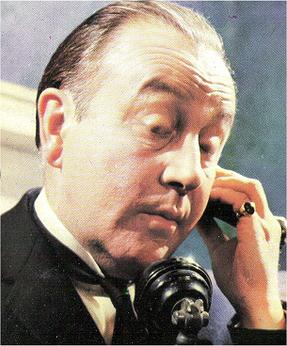
Dennistoun Franklyn John Rose Price was an English actor. He played Louis Mazzini in the Ealing Studios film Kind Hearts and Coronets (1949) and the omnicompetent valet Jeeves in 1960s television adaptations of P. G. Wodehouse's stories.

Stewart Granger was a British film actor, mainly associated with heroic and romantic leading roles. He was a popular leading man from the 1940s to the early 1960s, rising to fame through his appearances in the Gainsborough melodramas.

Gainsborough Pictures was a British film studio based on the south bank of the Regent's Canal, in Poole Street, Hoxton in the former Metropolitan Borough of Shoreditch, northeast London. Gainsborough Studios was active between 1924 and 1951. The company was initially based at Islington Studios, which were built as a power station for the Great Northern & City Railway and later converted to studios.
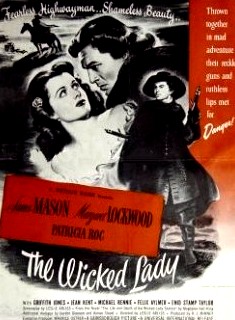
The Wicked Lady is a 1945 British costume drama film directed by Leslie Arliss and starring Margaret Lockwood in the title role as a nobleman's wife who becomes a highwaywoman for the excitement. It had one of the largest audiences for a film of its period, with an estimated British attendance of 18.4 million seeing it in cinemas, according to a 2004 ranking of the most popular sound films in Britain. In the list, compiled by the British Film Institute for Channel 4, it was placed ninth overall, and was the second-most successful British film, behind only Spring in Park Lane (1948).
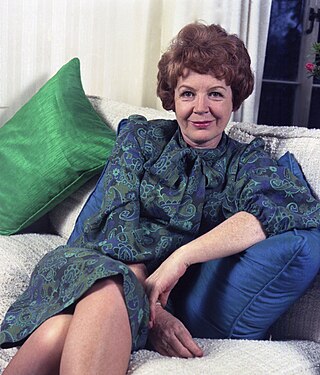
Phyllis Hannah Murray-Hill, known professionally as Phyllis Calvert, was an English film, stage and television actress. She was one of the leading stars of the Gainsborough melodramas of the 1940s such as The Man in Grey (1943) and was one of the most popular movie stars in Britain in the 1940s. She continued her acting career for another 50 years.

Jean Kent, born Joan Mildred Field was an English film and television actress.

The Man in Grey is a 1943 British film melodrama made by Gainsborough Pictures; it is considered to be the first of a series of period costume dramas now known as the "Gainsborough melodramas". It was directed by Leslie Arliss and produced by Edward Black from a screenplay by Arliss and Margaret Kennedy that was adapted by Doreen Montgomery from the 1941 novel The Man in Grey by Eleanor Smith. The film's sets were designed by Walter Murton.
Arthur Crabtree was a British cinematographer and film director. He directed films with comedians such as Will Hay, the Crazy Gang and Arthur Askey and several of the Gainsborough melodramas.
Leslie Arliss was an English screenwriter and director. He is best known for his work on the Gainsborough melodramas directing films such as The Man in Grey and The Wicked Lady during the 1940s.
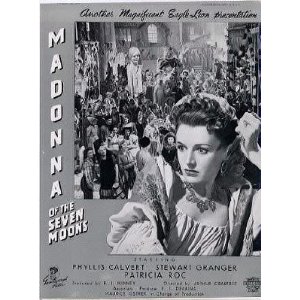
Madonna of the Seven Moons is a 1945 British drama film starring Phyllis Calvert, Stewart Granger and Patricia Roc. Directed by Arthur Crabtree for Gainsborough Pictures, the film was produced by Rubeigh James Minney, with cinematography from Jack Cox and screenplay by Roland Pertwee. It was one of the Gainsborough melodramas of the mid-1940s popular with WW2-era female audiences.

Fanny by Gaslight is a 1944 British drama film, directed by Anthony Asquith and produced by Gainsborough Pictures, set in the 1870s and adapted from a 1940 novel by Michael Sadleir.

Patricia Roc was an English film actress, popular in the Gainsborough melodramas such as Madonna of the Seven Moons (1945) and The Wicked Lady (1945), though she only made one film in Hollywood, Canyon Passage (1946). She also appeared in Millions Like Us (1943), Jassy (1945), The Brothers (1947) and When the Bough Breaks (1947).

Jassy is a 1947 British colour film historical melodrama directed by Bernard Knowles and starring Margaret Lockwood, Patricia Roc and Dennis Price. It was written by Dorothy Christie, Campbell Christie and Geoffrey Kerr based on the 1944 novel by Norah Lofts. Set in the early 19th century, it is a Gainsborough melodrama, the only one to be made in Technicolor, and was the last "official" Gainsborough melodrama.

Lady Eleanor Furneaux Smith was an English writer and active member of the Bright Young Things.
The Gainsborough melodramas were a sequence of films produced by the British film studio Gainsborough Pictures between 1943 and 1947 that conformed to a melodramatic style. The melodramas were not a film series but an unrelated sequence of films that had similar themes that were usually developed by the same film crew and frequently recurring actors who played similar characters in each. They were mostly based on popular books by female novelists and they encompassed costume dramas, such as The Man in Grey (1943) and The Wicked Lady (1945), and modern-dress dramas, such as Love Story (1944) and They Were Sisters (1945). The popularity of the films with audiences peaked mid-1940s when cinema audiences consisted primarily of women. The influence of the films led to other British producers releasing similarly themed works, such as The Seventh Veil (1945), Pink String and Sealing Wax (1945), Hungry Hill (1947), The White Unicorn (1947), Idol of Paris (1948), and The Reluctant Widow (1950) and often with the talent that made Gainsborough melodramas successful.
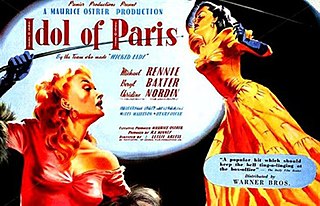
Idol of Paris is a 1948 British film directed by Leslie Arliss and starring Beryl Baxter, Michael Rennie, Christine Norden and Andrew Cruickshank. It was written by Stafford Dickens, Norman Lee and Harry Ostrer, based on the 1935 novel Paiva, Queen of Love by Alfred Schirokauer, about a mid-19th century French courtesan Theresa who sleeps her way from poverty to the top of Second Empire society. It was an attempt by its makers to imitate the success of the Gainsborough melodramas.

The Magic Bow is a 1946 British musical film based on the life and loves of the Italian violinist and composer Niccolò Paganini. It was directed by Bernard Knowles. The film was entered into the 1946 Cannes Film Festival.

The Man in Grey was a novel by the British writer Lady Eleanor Smith first published in 1941. It was a melodrama set in Regency Britain. A young woman unhappily married to a cold aristocrat falls in love with a strolling actor, but her hopes of eloping to happiness are wrecked by an old school friend who murders her in order to be able to marry her husband.

Harold Huth was a British actor, film director and producer.

Caravan is a melodramatic novel by the British writer Lady Eleanor Smith first published in 1942. A young Englishman James Darrell goes on the road living with the Romany people in England while trying to make enough money as a writer to marry his sweetheart Oriana. However, she does not wait for him and marries a wealthy young Englishman. James then undertakes a mission to Spain for a business friend, while there he is attacked and robbed. He is rescued by a gypsy woman but he has lost his memory. Having lost his memory, he marries the gypsy girl, Rosal, without knowing of his former life in Britain. When his memory returns he resents the gypsy girl for deceiving him but stays with her and works as a secretary for a famous bullfighter. When Rosal is accidentally killed by the bullfighter the hero goes to Morocco. Upon his return to England his book on his journeys in Spain make him a famous and wealthy man. He reunites with his first love, Oriana, who is trapped in a loveless marriage. The book is written as a young reporter is sent to interview James Darrell on the occasion of his 70th birthday, and is written as a "flashback" by the old author.

















